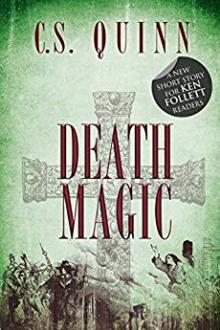Genre Mystery & Crime. Page - 4

Radnor frowned slightly.
"He doesn't forgive," he returned.
"What was the trouble with Jeff?" I ventured. "I have never heard any particulars."
"He and my father didn't agree. I don't remember very much about it myself; I was only thirteen when it happened. But I know there was the devil of a row."
"Do you know where he is?" I asked.
Radnor shook his head.
"I sent him some money once or twice, but my father found it out and shut down on my bank account. I've lost track of him lately--he isn't in need of money though. The last I heard he was running a gambling place in Seattle."
"It's a great pity!" I sighed. "He was a fine chap when I knew him."
Radnor echoed my sigh but he did not choose to follow up the subject, and we passed the rest of the way in silence until we turned into the lane that led to Four-Pools. After the manner of many Southern places the house was situated well toward the middle of the large plantation, and entirely out of sight from

asked.
"In Room B, away from the crowd. She is not alone. A young lady detained with the rest of the people here is keeping her company, to say nothing of an officer we have put on guard."
"And the victim?"
"Lies where she fell, in Section II on the upper floor. There was no call to move her. She was dead when we came upon the scene. She does not look to be more than sixteen years old."
"Let's go up. But wait--can we see that section from here?"
They were standing at the foot of the great staircase connecting the two floors. Above them, stretching away on either side, ran the two famous, highly ornamented galleries, with their row of long, low arches indicating the five compartments into which they were severally divided. Pointing to the second one on the southern side, the Curator replied:
"That's it--the one where you see the Apache relics hanging high on the rear wall. We shall have to shift those to some other place just as soon as we can recover from this horror

IN SEARCH OF A RELIGION.
BY MR. BENJAMINS.
CHAPTER I.
"I remember him a little boy," said the Duchess. "His mother was a dear friend of mine; you know she was one of my bridesmaids."
"And you have never seen him since, mamma?" asked the oldest married daughter, who did not look a day older than her mother.
"Never; he was an orphan shortly after. I have often reproached myself, but it is so difficult to see boys."
This simple yet first-class conversation existed in the morning- room of Plusham, where the mistress of the palatial mansion sat involved in the sacred privacy of a circle of her married daughters. One dexterously applied golden knitting-needles to the fabrication of a purse of floss silk of the rarest texture, which none who knew the almost fabulous wealth of the Duke would believe was ever destined to hold in its silken meshes a less sum than L1,000,000; another adorned a slipper exclusively with

indeed. I noticed it when I ventured to address monsieur on the steps of the Opera House."
I remained gloomily silent. It was one thing to avail myself of the society of a very popular little maitre d'hotel, holiday making in his own capital, and quite another to take him even a few steps into my confidence. So I said nothing, but my eyes, which travelled around the room, were weary.
"After all," Louis continued, helping himself to a cigarette, "what is there in a place like this to amuse? We are not Americans or tourists. The Montmartre is finished. The novelists and the story-tellers have killed it. The women come here because they love to show their jewelry, to flirt with the men. The men come because their womankind desire it, and because it is their habit. But for the rest there is nothing. The true Parisian may come here, perhaps, once or twice a year,--no more. For the man of the world--such as you and I, monsieur,--these places do not exist."
I glanced at my companion a l

ly thing which appeared black and was not black. Spike shuddered. He had never liked the sight of blood.
The match spluttered and went out. Spike looked around. He felt hopelessly alone. Not a pedestrian; not a light. The houses, set well back from the street, were dark, forbiddingly dark.
He saw a street-car rattle past, bound on the final run of the night for the car-sheds at East End. Then he was alone again--alone and frightened.
He felt the necessity for action. He must do something--something, but what? What was there to do?
A great fear gripped him. He was with the body. The body was in his cab. He would be arrested for the murder of the man!
Of course he knew he didn't do it. The woman had committed the murder.
Spike swore. He had almost forgotten the woman. Where was she? How had she managed to leave the taxicab? When had the man, who now lay sprawled in the cab, entered it?
He had driven straight from the Union Station to the address given by the woma

re I picked him up, do you?"
"I know where you said you picked him up. You said he was a stray soul lost in the wilderness of this great metropolis and that you had rescued him. You said you'd found him in front of your apartment building wasting away in the last stages of starvation, so I knew you were blind drunk, because the man had a belly like a balloon."
"In front of my apartment," Doan repeated thoughtfully. "This is all news to me. Could you give me a short and colorful description of this gentleman by the name of Smith?"
"He was tall and pot-bellied, and he had black eyebrows that looked like caterpillars and a mustache the rats had been nesting in, and he wore dark glasses and kept his hat on and his overcoat collar turned up. I mind particularly the mustache, because you kept asking him if you could tweak it."
"Ah," said Doan quietly. He knew now where he had gotten the instinctive warning about the metal case. Drunk as Doan had been, he had retained enough powers of obs

disgusted thud.
Chapter 2
DOAN PACKED IN TEN MINUTES FLAT, AND WHEN he got through the apartment looked as though he had done just that, but he didn't. He looked neat and fresh and cool in a light gray suit and a lighter gray hat and gray suede oxfords. He parked his two big, battered suitcases at the door, and as a last move pulled the cushions off the chesterfield and unearthed a Colt Police Positive revolver.
He slid that inside the waistband of his trousers, hooking it in a cloth loop sewn there for that purpose, and then he went over and pulled up the rug in the corner behind the bridge lamp. He found a .25 caliber automatic hidden there. He put that in the breast pocket of his coat and pushed an ornamental dark blue handkerchief down on top of it to keep it in place.
He was all ready to go when he had another thought. He took out his wallet and counted the money in it. The sum did not impress him. He put the wallet aw

to let you in."
Horn and Muller both looked the young man over very carefully. He seemed perfectly innocent, and their suspicion that he might have turned the key in pretense only, soon vanished. It would have been a foolish suspicion anyway. If he were in league with the murderer, he could have let the latter escape with much more safety during the night. Horn let his eyes wander about the rooms again, and said slowly: "Then the murderer is still here--or else--"
"Or else?" asked the doctor.
"Or else we have a strange riddle to solve."
Johann had laid the pistol down again. Muller stretched forth his hand and took it up. He looked at it a moment, then handed it to the commissioner. "We have to do with a murder here. There was not a shot fired from this revolver, for every chamber is still loaded. And there is no other weapon in sight," said the detective quietly.
"Yes, he was murdered. This revolver is fully loaded. Let us begin the search at once." Horn was more excited th

